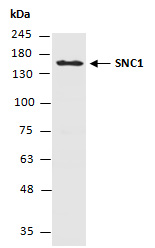Abiocode Logo
Products
Contact Us
- Telephone:
1-818-707-0309 - E-Mail:
Abiocode@Abiocode.com
R3588-1 - SNC1 (N) Antibody, Rabbit Polyclonal
|
Quantity: 100 ul Application: WB
Predicted I Observed M.W.: 148 kDa Uniprot ID: O23530
Background: SNC1 (Protein SUPPRESSOR OF npr1-1, CONSTITUTIVE 1) is a disease resistance protein of the TIR-NB-LRR-type. Resistance proteins guard the plant against pathogens that contain an appropriate avirulence protein via an indirect interaction with this avirulence protein, which triggers a defense system including the hypersensitive response that restricts the pathogen growth. The expression of SNC1 is regulated by RNA silencing and by MOS1 at chromatin level. SNC1 is negatively regulated at the transcript level by BON1. Nuclear localization of SNC1 is essential for its activity. ABA deficiency can rescue high-temperature inhibition of SNC1-mediated defense responses. Other Names: Protein SUPPRESSOR OF npr1-1, CONSTITUTIVE 1, AtSNC1, Disease resistance RPP5-like protein, BAL, At4g16890 Source and Purity: Rabbit polyclonal antibodies were produced by immunizing animals with a GST-fusion protein containing N-terminal region of arabidopsis thaliana SNC1 (At4g16890). Antibodies were purified by affinity purification using immunogen. Storage Buffer and Condition: Supplied in 1 x PBS (pH 7.4), 100 ug/ml BSA, 40% Glycerol, 0.01% NaN3. Store at -20 °C. Stable for 6 months from date of receipt. Species Specificity: Arabidopsis Tested Applications: WB: 1:500-1:2,000 (detect endogenous protein*) *: The apparent protein size on WB may be different from the calculated M.W. due to modifications. Product Data: References cited for this product: 1. Xu G, Yuan M, Ai C, Liu L, Zhuang E, Karapetyan S, Wang S, Dong X. uORF-mediated translation allows engineered plant disease resistance without fitness costs. Nature, 2017, 545:491-494.
|
